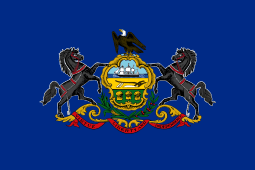Edward Shippen
Edward Shippen (1639, Methley, West Yorkshire, England – October 2, 1712, Philadelphia, Pennsylvania) was the second mayor of Philadelphia, although under William Penn's charter of 1701, he was considered the first.[1] He was appointed to a one-year term by William Penn in 1701. In 1702, he was elected to a second one-year term, making him the first elected mayor of Philadelphia. He was also a leader of the Province of Pennsylvania, and served as Chief Justice of the Supreme Court of Pennsylvania in 1699. He also served as the chief executive for the Province of Pennsylvania as the President of the Provincial Council between 1703 and 1704.[2]
_(cropped).jpg)
He first lived in Boston, where, according to family oral history, he was whipped for being a Quaker before being invited by William Penn to move his merchant business to the new city of Philadelphia.
After the sudden death of Deputy Governor Andrew Hamilton in 1703, Shippen, by virtue of being the President of the Provincial Council, became the chief executive of the Province of Pennsylvania. It was during his term that the Lower Three Counties (modern day Delaware) elected their own Assembly and acted in their own interests. These Counties however remained under the Penn Proprietorship and their appointed Deputy Governors until 1776 when Delaware became an independent State.[2]
Family
Edward was born in Methley to his parents, William and Mary, whom were married there on July 16, 1626. Shippen's father was settled in the village of his birth, Monk Fryston, before he migrated to Methley. Monk Fryston is closely linked to the village of Hillam, which was where the Shippen family had hailed from, possibly as early as the thirteenth century according to family tradition.
He married Elizabeth Lybrand, a Quaker, in 1671 and became a member of that sect. She died in Boston in 1688. Shippen married, secondly, at Newport, R. I., on September 4, 1689, Rebecca, widow of Francis Richardson, of New York, and daughter of John Howard, of Yorkshire, England. She died in Philadelphia on February 26, 1704 or 1705. He then married at Philadelphia in 1706, Esther, widow of Philip James, and daughter of John Wilcox. She died on August 7, 1724.[3]
One of Shippen's grandsons was Continental Congressman William Shippen. A granddaughter was the wife of Philadelphia Mayor Charles Willing, whose daughter was Mary Willing Byrd. Another grandson, Edward Shippen, III, was also a mayor of Philadelphia. Shippen's great-great-granddaughter was Peggy Shippen, wife of Benedict Arnold. Shippen was married to Elizabeth Lybrand in 1671.[4]
See also
- List of colonial governors of Pennsylvania
- Philadelphia history and timeline
References
- Montgomery, Thomas Harrison (1900). A History of the University of Pennsylvania from Its Foundation to A. D. 1770. Philadelphia: George W. Jacobs & Co.
- Armor, William C., Lives of the Governors of Pennsylvania, With the Incidental History of the State, from 1609 to 1872, Philadelphia, J.K. Simon (1873)
- Keith, Charles P., The Provincial Councillors of Pennsylvania: Who Held Office Between 1733 and 1776, Genealogical Baltimore (originally published in 1883)
- Jordan, John W. (2004-01-01). Colonial And Revolutionary Families Of Pennsylvania. Genealogical Publishing Com. ISBN 9780806352398.
External links
| Wikimedia Commons has media related to Edward Shippen, I. |
- Biography from Lawmaking and Legislators in Pennsylvania, Vol. One, 1682–1709, pp. 666–669
- Biography at Virtualology.com
- Edward Shippen at Find a Grave
| Preceded by Humphrey Morrey |
Mayor of Philadelphia 1701–1703 |
Succeeded by Anthony Morris |

